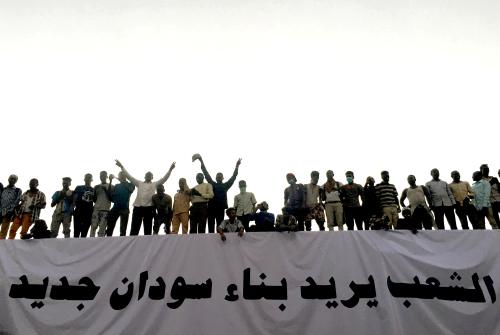Protests in Sudan persist despite al-Bashir’s removal
On Thursday, April 11, Sudanese Minister of Defense Awad Mohammed Ahmed Ibn Auf announced that President Omar al-Bashir had been removed from office and arrested after 30 years in power. As part of the transition, said Ibn Auf, the constitution will be suspended, a curfew imposed, and a three-month state of emergency instituted. Elections will be held in two years, before which a transitional military council will govern the country. Already, political prisoners are being released.
Not all have greeted al-Bashir’s departure with elation, though. Scores of protestors, led by the Sudanese Professionals Association, have expressed dismay and anger that the military will be running the country and not a civilian government as well as frustration that al-Bashir is the only official in the administration to leave. As a result and despite widespread celebration, demonstrations persist, arguing that this transition is “a continuation of the same regime.” The African Union has stated that the military seizure “is not the appropriate response to the challenges facing Sudan and the aspirations of its people.”
The original wave of protests began in December when al-Bashir stopped food and fuel subsidies in line with austerity recommendations by the International Monetary Fund (IMF) and World Bank. Though the measures were intended to stimulate growth, in the short term they were hurting citizens: The people, already plagued by an annual rate of inflation of 70 percent, could no longer afford to buy food. The protests were also symbols of the population’s frustration with corruption, poor administration (for example, only 7 percent of the national budget goes to health while 75 percent goes to defense and salaries of senior officials), and human rights abuses. Al-Bashir himself is under indictment by the International Criminal Court for crimes against humanity and genocide for his role in the atrocities in Darfur. Notably, Ibn Auf has been under U.S. sanctions for his role in that conflict as well.
In related news, Algerian officials have scheduled elections for July 4 of this year following the resignation of long-time ruler Abdelaziz Bouteflika after weeks of protests.
Pope Francis hosts South Sudan peace summit
On Wednesday, South Sudan’s President Salva Kiir, opposition leader Riek Machar, and other leaders participated in a 24-hour peace retreat at the Vatican with Pope Francis. The summit was characterized as “24 hours of prayer and preaching” and comes a month before the planned formation of a unity government in South Sudan following the peace agreement last year. In his remarks, Pope Francis urged the warring leaders to “stay in peace” and move forward. According to Reuters, Pope Francis kissed the feet of both Kiir and Machar and several others in the room, stunning both leaders. As part of the peace deal, Machar is expected to be reinstated as vice president.
In other South Sudan news, last week the country’s information minister announced that it would increase its oil supply to the Export-Import Bank of China to 30,000 barrels of oil per day from the current number of 10,000. This new amount constitutes almost one-sixth of South Sudan’s current oil production. In return, China is expected to fund infrastructure projects in the country including construction of a 244-mile road from Juba to Rumbek.
World Bank and IMF revise economic outlook for sub-Saharan Africa
On Monday, as part of its Africa Pulse biannual publication, the World Bank cut its growth forecast for sub-Saharan Africa from 3.3 percent to 2.8 percent. In addition, the World Bank estimated that economic growth in sub-Saharan Africa decelerated from 2.5 percent in 2017 to 2.3 percent in 2018, remaining below the rate of population growth for a fourth consecutive year.
According to the Bank, the slower growth reflects ongoing global uncertainty as the trade dispute between China and the United States takes its toll internationally. Additionally, growth is already taking longer to recover after the 2015 commodity price slump that cut short the potential for rapid growth in the sub-Saharan African region.
The IMF followed the World Bank, cutting the region’s 2019 growth forecast from 3.8 percent to 3.5 percent, remaining slightly more optimistic than the Bank. Both forecasts cited Nigeria, South Africa, and Angola—which make up nearly 60 percent of sub-Saharan Africa’s annual economic output—facing several economic challenges. For instance, challenges in the oil sector including weakening oil prices played a large role in downward revisions for Angola and Nigeria. And timid investment growth in South Africa, in part due to low business confidence, tempered South Africa’s growth prospects.
The World Bank noted the digital economy can be a source of growth, especially due to its ability to foster innovation, spark new jobs, and improve goods and service delivery. Currently, the continent lags the rest of the world in access to broadband, with only 27 percent of the continent’s population having access to internet.






Commentary
Africa in the news: Sudan faces regime change, Vatican hosts South Sudan peace summit, and IMF and World Bank release growth projections
April 13, 2019